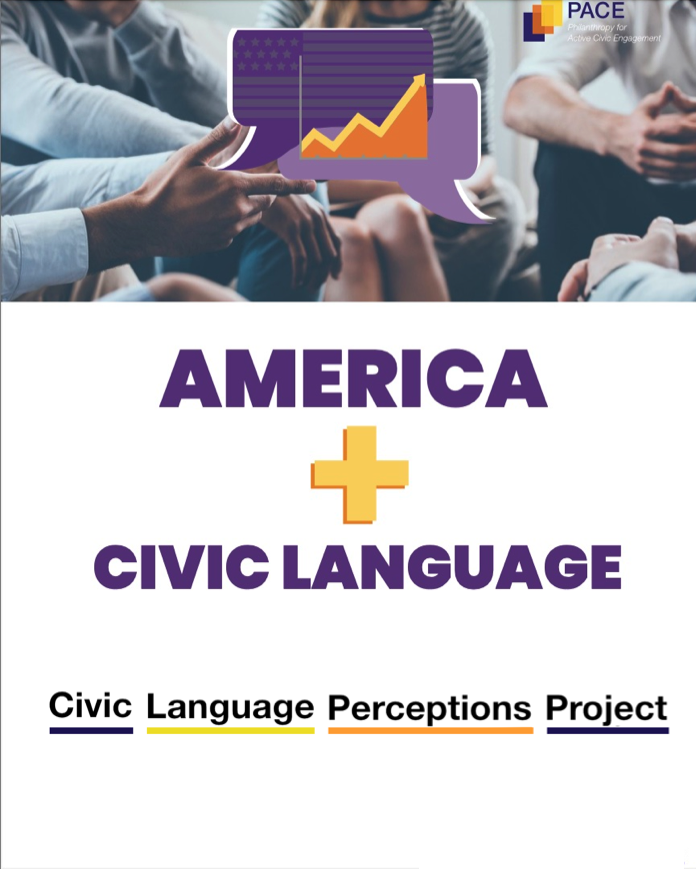
Philanthropy for Active Civic Engagement (PACE)’s Civic Language Perceptions Project is a three-year exploration into what Americans think about terms that are commonplace in “professional” civic spaces but perhaps not the everyday word choice of many people– terms like democracy, privilege, and pluralism. When we launched the project, we hoped it would ultimately tell us (and others) whether our neighbors are familiar with these terms and how to use this language without going over people’s heads.
Why study Americans’ perceptions of civic language? Because studies suggest that an informed vernacular about civic life in America is becoming increasingly rare. Many Americans lack knowledge about even the most basic facts about their government. For example, the latest round of the Annenberg Public Policy Center’s annual survey found that less than half (47%) of U.S. adults could name all three branches of government, down from 56% in 2021, and fewer Americans could name any of the five rights protected by the First Amendment in 2022 than in 2021.
Coupled with reduced civic knowledge is decreased engagement in civic behaviors, whether it be participation in community organizations or elections – especially among young Americans. School-based civic educational experiences are inconsistent (or non-existent) in many states, and we also know declines in media and journalism contributes to a lack of civic knowledge as well. Many are pointing out the stakes of revitalizing civic knowledge and engagement in our country: Without it, we will struggle to defend democracy and prevent tyranny.
Our study produced thousands of data points (16,000 pages, actually!), and we analyzed it through focus groups, mini-grants, and many other mechanisms. To understand the results even more deeply, we hosted five “Civic Language Solution Sprints” that invited over 50 funders, practitioners, and thought leaders to discuss their experiences around the thorniest civic language perceptions emerging in the study, such as perceptions that:
- Young people are negative about “democracy”
- Some words are “owned” by certain people or groups
- The term “civic” is not landing
- Civic terms are favored by historically “dominant” identities
- There is a disconnect between professional usage and public perception of civic language
These conversations led to many lessons for those of us who are trying to motivate or mobilize everyday people toward strengthening democracy. Here are three our team has been sitting with.
Start with language already in people’s vocabulary.
As one participant stated (paraphrased): “We need to get away from civic words that are ‘buzzy’ to words that have application outside the civic field, and to do that, we need to engage the audiences we seek to engage in the language creation process.” Many people shared that an effective strategy toward this is to start with their current understanding of concepts and connect deeper terms to the frameworks they already know. This requires a listening posture and the ability to translate their words and experiences to civic language.
An example of this came from a group that coordinated a youth civic engagement event. After talking with youth leaders, they decided that instead of calling it a “civic engagement event,” they would brand the event as “Do you hear me now?” which more directly connected with young people’s desire to be heard, seen, and valued as active community contributors–all things that civic engagement embodies.
Deconstruct terms and paraphrase quickly
For better or for worse, one of the ways participants have navigated civic language challenges is to use the term, and then quickly get to explaining what they mean by the term in plain, non-technical language. Here are specific examples that came up throughout our sessions:
- By bridging, we mean putting people who don’t agree with each other in the same room.
- By democracy, we mean how you govern your own life and participate in community, not just a form of government.
- By pluralism, we mean how we are many people, living and working together.
In our fast-pace media environment where time to explain what you mean is not always afforded, taking opportunities to clarify terms is vital, otherwise people may draw their own conclusions about what they think you mean, which can lead to misinterpretation or even disengagement.
Focus less on building shared language and more on building shared experiences
Many participants across our sessions acknowledged that while we are talking about language challenges, they are a symptom of a larger issue: Americans have fewer shared contexts and experiences through which to engage with other people, especially those who are different from them. As one participant said, “I see this as part of the broader fracturing of the information environment. Different communities are using different information sources, coming to different facts/conclusions, using different language.”
However, there is hope. One helpful piece of advice provided during a sprint is to pair words together that appeal to “opposite” groups. For example, groups might experiment with using democracy (rated more positively by liberals, Democrats, upper class, and urban respondents) and liberty (rated more positively by conservatives, Republicans, working class, and rural respondents) in close proximity to each other.
I hope that sharing some of the wisdom that we gathered from civic leaders in the field provides guidance and food-for-thought as you navigate your specific civic language challenges. From here, PACE will continue to explore civic language and Americans’ perceptions and associations of the words that fuel our civic lives. I invite you to check back to PACEfunders.org/Language for new published learnings, findings, and events.


